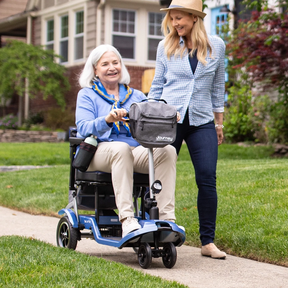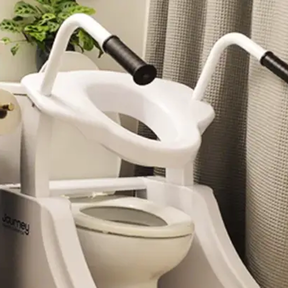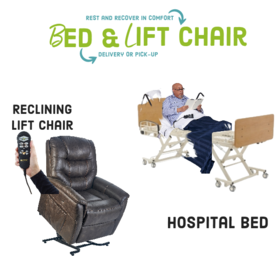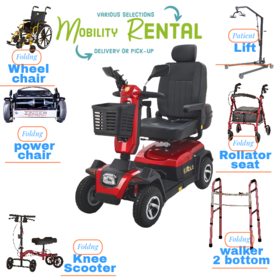Blog Importance of Wellness and Fitness after Colostomy Surgery:
After undergoing a colostomy surgery, it's common to experience decreased stamina and energy levels. This can be due to a variety of factors, including the physical trauma of the surgery and the changes to the body's digestive system.
However, staying active and engaged in physical activity is important to promote overall wellness and prevent muscle atrophy. Exercise can also help improve bowel function and reduce the risk of complications such as hernias.
Tips for Starting an Exercise Routine
Starting an exercise routine after colostomy surgery can feel overwhelming, but there are many ways to ease into it. Here are some tips:
- Consult with your doctor before starting any exercise routine
- Start with low-impact exercises such as walking or gentle yoga
- Incorporate resistance training to build muscle and improve overall strength
- Stay hydrated and fuel your body with nutrient-dense foods
Tracking Progress and Setting Goals
Tracking your progress and setting achievable goals is a great way to stay motivated and measure your success. Consider using a fitness tracker or journal to monitor your activity levels and set weekly or monthly goals.
Working with a Personal Trainer
If you're new to exercise or unsure about getting started, working with a personal trainer can be a great option. A trainer can help you develop a safe and effective exercise plan that takes into account your unique needs and limitations.
By following these tips and staying committed to your fitness goals, you can improve your stamina and overall wellness after colostomy surgery.
Exercises to Improve Your Bowel Movement
Bowel movement is an important aspect of digestive health, and regular exercise can help promote bowel regularity and prevent constipation. In this article, we'll explore some exercises that can help improve your bowel movement.
Walking
Walking is a simple yet effective exercise that can help stimulate bowel movement. Taking a brisk walk for 15-30 minutes after a meal can help get your digestive system moving and prevent constipation.
Squats
Squats are a great exercise for promoting bowel regularity. The movement helps to massage the digestive organs and can encourage the release of waste. Start with bodyweight squats and gradually increase the intensity as you build strength.
Yoga
Yoga is a low-impact exercise that can help improve digestion and promote bowel regularity. Certain poses, such as the seated twist and the reclining hero pose, can be particularly beneficial for digestive health.
Pelvic Floor Exercises
The pelvic floor muscles play an important role in bowel movement, and exercises that strengthen these muscles can help prevent constipation. Kegels are a popular pelvic floor exercise that involves contracting and relaxing the muscles that control urination and bowel movement.
Cardiovascular Exercise
Cardiovascular exercise, such as running or cycling, can help stimulate bowel movement and improve digestion. Aim for at least 30 minutes of moderate-intensity cardiovascular exercise per day.
Abdominal Massage
Abdominal massage is a gentle technique that can help stimulate bowel movement and relieve constipation. Massage your abdomen clockwise for a few minutes each day using circular motions.
Incorporating these exercises into your daily routine can improve your bowel movement and promote digestive health. Remember to stay hydrated to support healthy bowel function.
Tags
- contest
- event
- supplies
- design
- brand
- video
- Compression
- upright walker
- four wheel walker
- rollator
- wheelchair
- Ostomy
- elegantly
- elegantly
- accessibility
- Mobility
- knee walker rental
- knee scooter sales
- knee scooter
- post operative shoe
- anti-embolic stockings
- pain management
- cryotherapy therapy
- hot cold compress
- compression stockings
- lift chair
- wound Care
- air purifier
- fall prevention
- cushion
- oxygen therapy
- cpap, bipap
- Hospital Bed
- Life Aide
- EMS
- recovery
- splint
- knee brace
- Bathroom
- patient lift
- medical supply
- Wound dressings
- Lightweight Wheelchair
- hospital beds for sale
- sky medical supplies rentals
- compression socks
- Adult Diapers
- Rollator Walker
- Bed Wedge Pillow
- Hospital beds
- Patient Lifts and Slings
- Portable Oxygen Concentrator
- Patient Lift Slings
- knee scooter rental
- folding mobility scooter
- mobility scooter
- medical shoes
- raised toilet seat
- hospital beds for rent
- lift chair recliner
- chair lift
- electric wheelchair
- Power Lift Recliners for Elderly
- Senior Walkers
- Bedside Commodes
- whill wheelchair
- compression hose
- Whill Electric Wheelchairs
- Bariatric Wheelchair
- Recliner Chairs with Lift
- Colostomy Bag
- Crutches
- Medical Wedge Pillow
- skin barrier tape
- Post Surgery Ice Machine
- Bedside Commode
- chair lift recliners
- cane holder scooter
- lift chair prices
- drop arm commode
- rollator walker with ergonomic seats
- Hospital Bed Rental
- Wheelchair Tray
- Golden Technologies Lift Chair
- Nova GetGo Junior Rollator
- power lift recliners
- Knee Scooters and Crutches:
- stand up walker for seniors
- stand up walker as seen on TV
- Women's Walking Canes
- Knee Immobilizers
- Bed Wedge Pillow
- Medical Supply Stores
- Sit to Stand Lifts
- Grab Bars
- Compression Gloves
- incontinence bed pads
- Lift Reclining Chair
- Knee Walker Scooters
- Hernia Belt Near You
- Mobility Scooter Stores Near Me
- Folding Knee Walker
- Oxygen Concentrator Store
- Inogen Battery
- Electric Bed Frames
- Placing Lift Chair
- diaper brief






